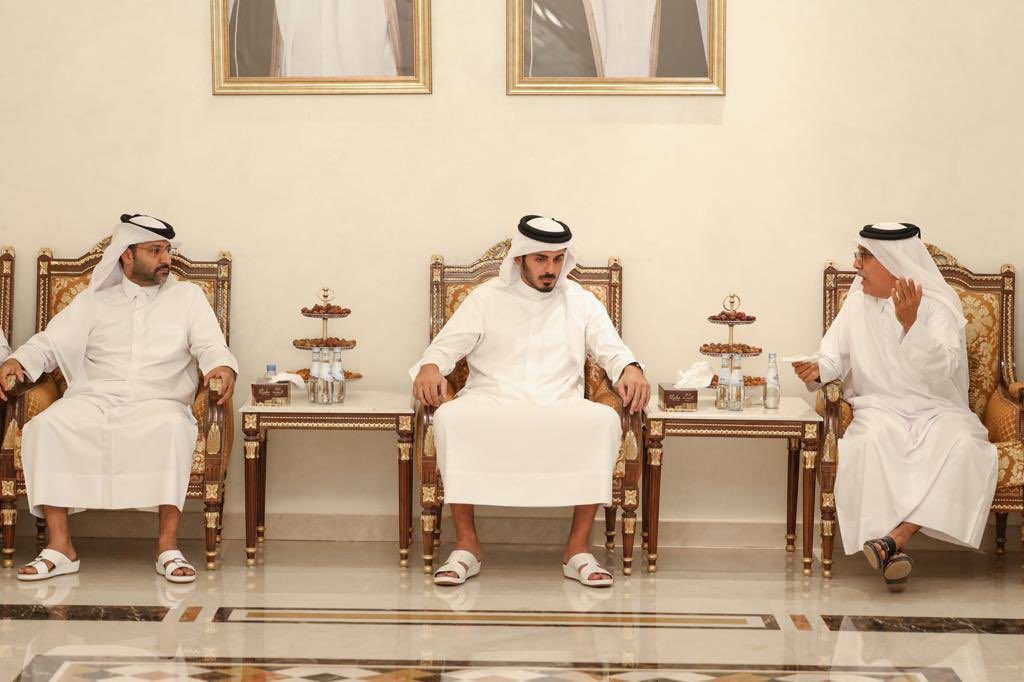The tribes were among those excluded by the Shura Council election laws that sparked debates in Qatar last week.
Sheikh Khalifa bin Hamad Al Thani paid a visit to the home majlis of the Bin Yafei tribe on Monday, in a gesture that has gone viral following days of small-scale protests over election rules.
https://twitter.com/7amadalyafei/status/1426822859201069062
The brother of the amir was seen with leaders of the tribe in images and videos that went viral online, in response to discontent expressed by some tribal members.
Tension has been rising among some tribes over Shura Council election laws that stipulate who can vote and be nominated in the country’s first ever legislative elections.
As per current law, Qatari citizens will be able to vote for 30 members of the 45-seat legislative council while the remaining 15 members will be selected by the amir himself.
To vote, Qatari nationals must be 18 by the time the final electoral lists are announced. However, those who have been nationalised are only eligible if their paternal grandfather was born in Qatar.
For those wishing to win a seat in the council, candidates must be originally Qatari and aged 30 and above by the closing date of the nomination. As per a referendum voted in by Qataris in 2003, such laws can only be changed by the Shura Council, which is unable to do so until it is elected into office.
Read also: ‘This is inhumane’: Qatar’s community scrambles to help Lebanon amid total collapse
However, these stipulations were met with objection by some who described them as “discriminatory” against members of Qatari society who cannot run as they are not considered “native Qatari”.
The dispute caused divisions among some members of the Al Marra and Bani Yafei tribes.
https://twitter.com/GladiatorGrl/status/1426959638537326593
On social media, members of the Al Marra tribe complained that they are unable to run for Shura Council elections as they are not “native Qatari” as per the law, stirring up anger among the community.
Supporters of the tribe took to social media to object the electoral law and last week, the Arabic hashtag “Al_Marra_was_Qatari_Before_the_Government” trended on Twitter, with many defending the tribe and its longstanding roots in Qatar.
Other members of those tribes have come out in support of the laws.
While the debate concerns legitimate demands, a months-long Doha News investigation has revealed how topics that have trended in Qatar in recent months have been proven to be pushed by dubious bots and fake accounts, posing serious questions over foreign interference as the Gulf state gears up for the elections.
Qataris that have called for calm have accused some objectors of pushing a foreign agenda at a critical time for the Gulf state, with some even pointing to the fact that some of the objecting tribes have “roots in the United Arab Emirates and Saudi Arabia.”
However, the days long protests have since subsided, with senior members of both tribes seen visiting one another to suggest a resolve in the dispute.
Qatari Nationality Law
According to Article 1 of the Qatari Nationality Law, those who are considered ‘originally Qatari’ are:
- Those who settled in Qatar before 1930 AD and maintained their residence there, and retained their Qatari citizenship until the effective date of Law No. 2 of 1961.
- Whoever proves to be of Qatari descent, even if they do not meet the conditions stipulated in the previous clause, and an Amiri decision has been issued as such.
- Those to whom Qatari citizenship has been given, in accordance with the provisions of the law.
- Whoever was born in Qatar or abroad to a Qatari father under the previous clauses.
Follow Doha News on Twitter, Instagram, Facebook and Youtube







